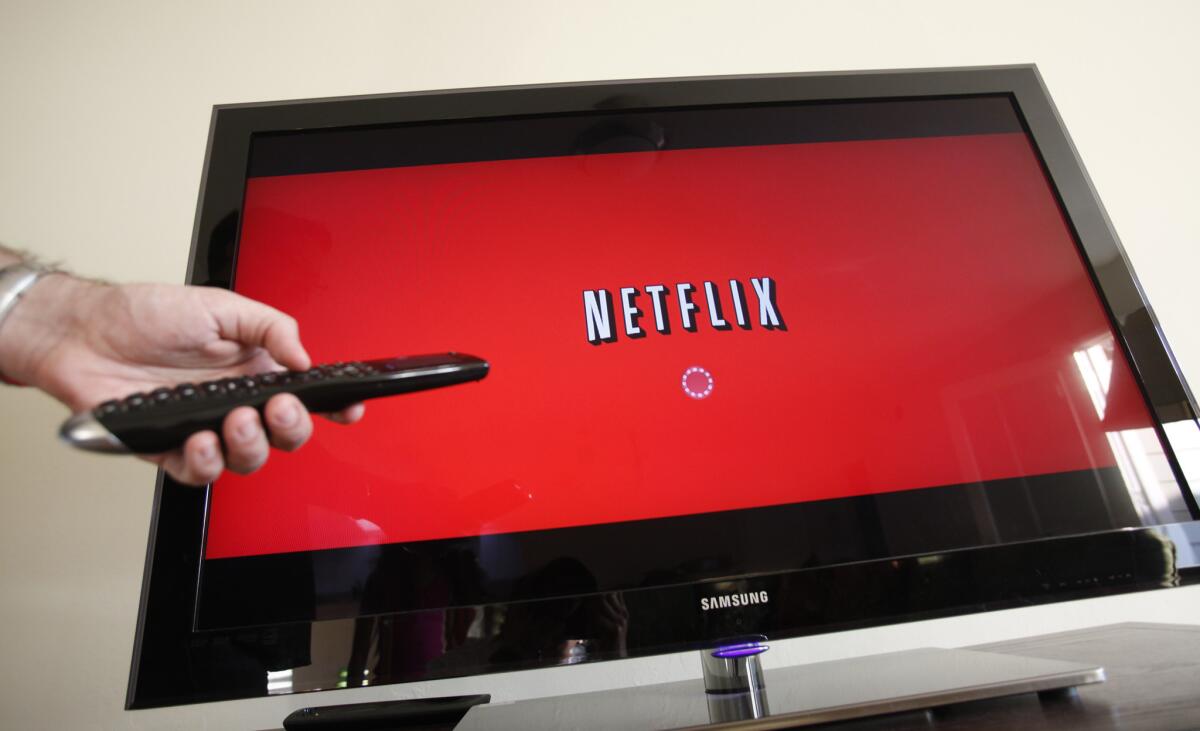Opinion: Netflix complaints about ISPs get FCC’s attention, but how much else?

Federal Communications Commission Chairman Tom Wheeler has been saying for months that he’s concerned about the amount of power that last-mile Internet service providers such as Comcast and AT&T have in negotiations with other ISPs.
On Friday, Wheeler made those concerns official -- for the second time. But the agency may be hard-pressed to do more than gather information because its authority to regulate ISP-to-ISP deals appears to be quite limited.
The FCC released a statement by Wheeler revealing that he’s launched an informal inquiry into the terms that last-mile ISPs are setting for interconnection. That’s on top of the questions that the FCC posed about interconnection issues in net neutrality rulemaking.
Thank Netflix for putting the issue on the commission’s radar screen. The company has been grousing about broadband ISPs’ power over interconnection practically since the day it struck a deal paying Comcast for the right to feed traffic directly into its networks.
Netflix Chief Executive Reed Hastings contends that last-mile ISPs are “extracting a toll” from the company to deliver its streams to customers at an acceptable level of quality. Some analysts, most notably Dan Rayburn of Frost & Sullivan, have pushed back, asserting that Netflix caused congestion problems by directing its traffic through ISPs that couldn’t handle the volume.
Whatever the explanation, this issue is a big deal to anyone who has to put up with stuttering audio and video streams during peak Internet usage hours -- Wheeler included.
“Consumers pay their ISP and they pay content providers like Hulu, Netflix or Amazon. Then when they don’t get good service they wonder what is going on,” Wheeler said in Friday’s statement. “I have experienced these problems myself and know how exasperating it can be.”
Only the ISPs involved know for sure what’s going on, which is why the FCC’s fact-gathering mission could prove enormously helpful. And the agency’s decision to jump into the issue so quickly -- by government standards -- typifies Wheeler’s tenure as chairman. For a bureaucrat, he moves with remarkable alacrity.
But even if the commission turns up something unseemly, its authority to do anything other than moan about it is far from certain. The constraints on the agency may be even more severe than the ones in the net neutrality proceeding.
In two rule-makings from the early 2000s, the commission classified broadband Internet access as an information service subject only to limited regulation. But it appears never to have pushed its tentacles deeper into the Internet to regulate activity among ISPs. That’s true largely because it never needed to. There was so much competition among transit services (e.g., services that deliver data from a website to the last-mile ISPs), backbone providers and the like that the industry was able to regulate itself effectively. Up to now, at least.
Wheeler emphasized that the agency was simply “collecting information, not regulating.” He added: “We are looking under the hood.... The bottom line is that consumers need to understand what is occurring when the Internet service they’ve paid for does not adequately deliver the content they desire, especially content they’ve also paid for. In this instance, it is about what happens where the ISP connects to the Internet.”
Specifically, the FCC is looking at the deals Netflix struck with Comcast and Verizon, and is asking content providers and ISPs for the details about other, unspecified interconnection agreements.
Michael Weinberg of Public Knowledge, a tech advocacy group that supports strong net neutrality rules, said there’s little doubt that the agency can investigate. Whether it can regulate, however, depends on whether it can show that interconnection issues fall under the commission’s authority under Section 706 of the Communications Act.
A federal appeals court agreed this year that Section 706, which Congress enacted as part of the Communications Act of 1996, gave the FCC power to regulate broadband Internet access services as needed to promote investment in broadband. But that power is limited, the court held, and does not allow the commission to flatly ban ISPs from discriminating unreasonably against online sites, services and applications.
Julie Samuels of Engine, an advocacy group for Internet entrepreneurs, said the dispute between Netflix and broadband ISPs “falls squarely under the nondiscrimination piece” that the court barred the FCC from regulating under Section 706. To address the issue, she said, the FCC would have to reclassify broadband as a telecommunication service subject to Title II of the Communications Act.
Broadband ISPs fiercely oppose reclassification, as do deregulatory-minded Republicans on Capitol Hill (and at the FCC). But Samuels, Weinberg and many other tech-industry advocates contend that reclassification is the only way to assure net neutrality too.
Wheeler’s proposed net neutrality rules are based on the FCC’s authority under Section 706. The agency ask,s as part of the rule-making, whether it can use this approach to block paid prioritization, or deals that call for an ISP to put a partner’s traffic ahead of other companies’ data in the queue. Without strong protections against paid prioritization, critics say, any net neutrality rules would be meaningless.
Follow Jon Healey’s intermittent Twitter feed: @jcahealey
More to Read
A cure for the common opinion
Get thought-provoking perspectives with our weekly newsletter.
You may occasionally receive promotional content from the Los Angeles Times.











